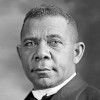The world cares very little about what a man or woman knows; it is what the man or woman is able to do that the world cares about.
Booker T. Washington (1856-1915) American educator, writer
“Mind and Matter,” Speech, Alabama State Teachers’ Association, Selma (5 Jun 1895)
Washington reused material in various speeches he gave. In an address to the African Methodist Episcopal Zion Church, Boston (30 July 1903), he phrased this: "The world cares very little what you or I know, but it does care a great deal about what you or I do."
Quotations by:
Washington, Booker T.
I have learned that success is to be measured not so much by the position that one has reached in life as by the obstacles which he has overcome while trying to succeed.
I would permit no man, no matter what his colour might be, to narrow and degrade my soul by making me hate him.
Booker T. Washington (1856-1915) American educator, writer
Up from Slavery, ch. 11 (1901)
(Source)
This has been paraphrased in various ways, and is the source of Martin Luther King, Jr's quote he attributed to Washington: "Let no man pull you so low as to make you hate him" (e.g., Stride Toward Freedom, ch. 6 (1958)). King used this or variants of this paraphrase frequently in his speeches, though it was only in his early activism that he referenced Washington by name.
Our greatest danger is that in the great leap from slavery to freedom we may overlook the fact that the masses of us are to live by the productions of our hands, and fail to keep in mind that we shall prosper in proportion as we learn to dignify and glorify common labour and put brains and skill into the common occupations of life; shall prosper in proportion as we learn to draw the line between the superficial and the substantial, the ornamental gewgaws of life and the useful. No race can prosper till it learns that there is as much dignity in tilling a field as in writing a poem.
Booker T. Washington (1856-1915) American educator, writer
Speech, Cotton States and International Exposition, Atlanta (18 Nov 1895)
(Source)
Reprinted in his autobiography, Up from Slavery, ch. 14 "The Atlanta Exposition Address" (1907).
One man cannot hold another man down in the ditch without remaining down in the ditch with him.
Booker T. Washington (1856-1915) American educator, writer
Speech, Republican Club, New York City (12 Feb 1909)
(Source)
Sometimes paraphrased, "You can't hold a man down without staying down with him."
In any country, regardless of what its laws say, wherever people act upon the idea that the disadvantage of one man is the good of another, there slavery exists. Wherever, in any country the whole people feel that the happiness of all is dependent upon the happiness of the weakest, there freedom exists.
Booker T. Washington (1856-1915) American educator, writer
Speech, Republican Club, New York City (12 Feb 1909)
(Source)

